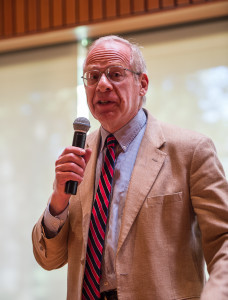
LILY SEIBERT
seibertl@grinnell.edu
Yesterday, Oct. 1, the Grinnell History Department welcomed Dr. Jonathan Rose to speak about his recent work surrounding the literary life of Winston Churchill. During his talk, Rose delved into the different facets of Churchill’s life, ranging from politics to war to human rights activism and how his love for the theatre informed his every move. However, as Rose eventually elaborated, several elements of his speech were somewhat misleading.
“The title of my talk is Winston Churchill as a Playwright,” Rose said. “Churchill never wrote a play.”
Churchill did, however, partake in almost every other literary endeavor imaginable, including poetry, scientific writing, film writing and journalism. Although he never took his talents to the stage, Rose argued that it was the theatre that inspired Churchill the most.
“His entire life was a play, and it was composed by him as if he were a playwright,” Rose said.
To exemplify his point, Rose described an occasion in which Churchill, working for the Ministry of Munitions in World War I, invited poet and staunch pacifist Siegfried Sassoon to spend time with him at his job. Churchill wasted no time in ranting to Sassoon about the destructive but wonderful forces of war and how it serves to mobilize human power and advance technology. He ended by offering Sassoon a career at the Ministry of Munitions, working for an industry to which he held strong objections. Churchill was not, however, sincere in his attempts to sway Sassoon away from his personal beliefs. Instead, he was acting out a scene from one of his favorite plays, entitled “Major Barbara,” in which a character named Andrew Undershaft attempts to convince a peacemaker of the wonders of war.
“He reads a novel, sees a play and then he tries to enact it on the grounds of politics,” Rose said. “That’s his stage.”
Churchill, as it turns out, was onstage or behind the scenes for the large majority of his life. Whether negotiating with Joseph Stalin, warning his colleagues about the oncoming threat of Hitler or strategizing in war efforts, he never missed a chance to work his favorite literary tale into reality or generate a performance.
“He had all the dramatic skills that would make him a great playwright if he had chosen to go in that direction,” Rose said. “He knew how to construct dialogue, construct speeches, the impact of a silent gesture, the pregnant pause. This, of course, helps to explain why he was an effective orator.”
Another point Rose stressed was the fact that all humans, in one form or another, put on a performance in their daily lives. This belief was something Churchill recognized and used to his advantage.
“There’s no such thing as acting naturally,” Rose said. “That’s impossible, or it’s a total bore. The human personality must be crafted as a work of art. You are always onstage, you are always performing.”
Rose delivered his talk to a packed room of students and faculty eager to learn about a more subtle part of Churchill’s character.
“It brought a different light to Winston Churchill as a historian and it made me see him as more of a literary personality and a writer,” said Farah Omer ’19.
Rose’s talk helped to shed light on a profound and enigmatic figure embedded deep in the trenches of European history.

















































